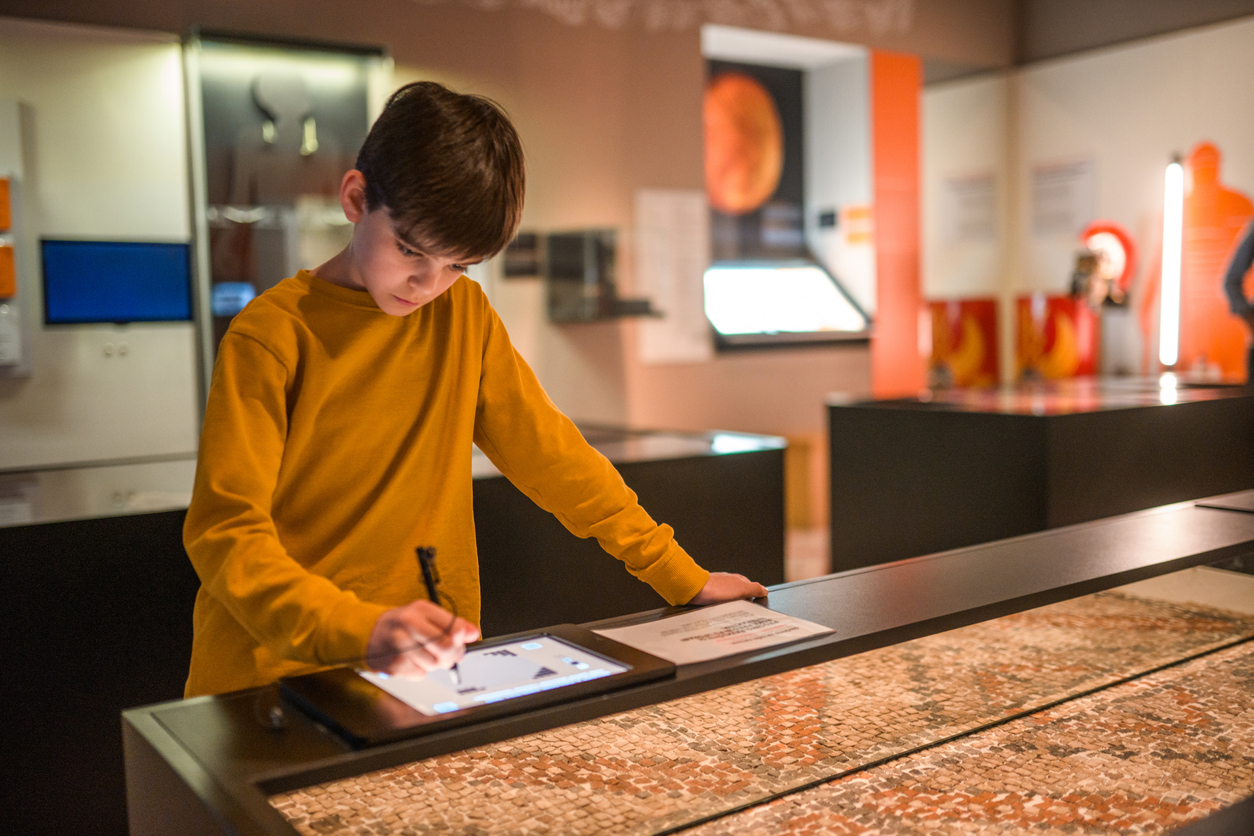Digital Humanities: Definition and Overview
Written by:
Wilson College
• Jan 9, 2024

Digital Humanities: Definition and Overview
As digital technology extends into society, its role in advancing the humanities is also expanding. Consider, as a case in point, how museums responded when the COVID-19 pandemic initially caused them to close their doors. By using digital technology, many museums pivoted and were able to begin offering virtual experiences. When the American Alliance of Museums (AAM) surveyed museums in 2021 and 2022, it found that 76% of them planned to continue those virtual offerings, a reflection of the value of those experiences to the people they serve.
Virtual experiences are just one example of the important place that digital humanities has in today’s world. From art to history to music and beyond, blending digital technology with the humanities holds the promise of enhancing the study of the humanities and enabling people to experience the humanities on new levels.
Anyone who’s contemplating enrolling in a Bachelor of Arts (B.A.) in Liberal Studies degree program can benefit from exploring a digital humanities definition and what digital technology has to offer the humanities.
Forming a Digital Humanities Definition
In its broadest sense, digital humanities is rooted in the use of digital technologies to study, conduct research, and educate people about the humanities. Through the application of digital technology, scholars can digitize, research, and make humanities-related content available to a much wider audience.
Digital humanities has opened new avenues for researchers to conduct their work and share it with the world. Whether they’re conducting research in literature, history, music, or cultural heritage, scholars can take advantage of technology to delve deeper into their areas of interest and make discoveries that can lead to advances in their fields.
Digital humanities can encompass many different techniques. For example, scholars can apply digital technology to do the following:
- Analyze metadata related to humanities content.
- Perform in-depth visual analysis of humanities content.
- Translate humanities-related content.
- Preserve and archive humanities content.
- Use geographic information systems to study humanities content.
- Transcribe humanities content.
How Digital Humanities Can Advance Scholarship
Individuals who are interested in earning a liberal studies degree can benefit from learning about the ways in which digital humanities can advance scholarship. Digital technology offers many avenues for individuals to make progress in humanities scholarship in ways that wouldn’t have been possible just a few years ago. The information below provides examples of advancing scholarship through the digital humanities.
Text and Data Mining
In defining digital humanities, noting the benefits of using digital technology to conduct text and data mining (TDM) on humanities content is important. This can enable researchers to identify patterns, connections, and insights that they couldn’t identify without the use of technology. It can also help researchers create algorithms and other digital tools to enhance their understanding of the humanities and explore the complexity of humanities content in greater detail.
Network Analysis and Mapping
Using digital technology, researchers can map the social networks of individuals and map their connections with other people and events. These efforts can, for example, place historical events in better context and reveal insights that enhance our understanding of world events and the dynamics at play as those events unfolded.
Creation of Animated Archives That Can Facilitate Virtual Experiences
Researchers can develop virtual experiences through digital technology in areas such as animation and simulation. This can bring experiences in the humanities to people who might not otherwise have the opportunity to learn about topics in history, culture, and the literary world. Virtual experiences can also be woven into educational resources to give students new ways to learn about the humanities.
Formation of Digital Libraries
Advances in digital technology have enabled researchers to create digital libraries that can serve as a central repository for items such as books, photographs, copies of historical documents, and other digital content. These libraries can aid both the public and scholars in accessing content about a specific topic in a single location.
Examples of Digital Humanities Research Accomplishments
Exploring specific examples of accomplishments in digital humanities can help to demonstrate what digital humanities is. The following projects highlight how digital humanities is breaking new ground:
-
Bringing ancient scrolls to the world. Researchers have created a website that enables users to explore digitized versions of ancient Arabic scrolls and experience various virtual lessons in subjects such as Arabic script and ancient systems of writing.
-
Analyzing crime and linguistics. Scholars have used text mining to explore roughly 200,000 trials from London’s criminal court during the time period from 1674 to 1913. This has enabled them to pinpoint patterns in crime and social attitudes about crime over time. These efforts have also yielded insights into how linguistics and grammar have changed over time.
-
Providing the ability to enter into the world of literary works. Digital technology has enabled researchers to create an educational game that allows users to step into the world of James Joyce’s Ulysses and interact with specific characters in the novel.
The National Endowment for the Humanities (NEH) has also provided funding for researchers who are:
-
Making textiles available worldwide. Researchers have created 3D models of textiles and historic clothing that scholars and the public can access to conduct research or simply learn more about these items.
-
Following the movement of people. Scholars have developed a digital atlas that traces the emancipation of enslaved people in the U.S. to enhance our understanding of emancipation.
-
Providing the opportunity to experience historical events. In building a web-based role-playing environment that enables users to experience important events during the U.S. Civil War, professionals who have expertise in digital humanities have enabled users to expand their knowledge and understanding of those events.
-
Preserving the memories of individuals who were witnesses to history. Using digital technology, scholars have preserved the memories of individuals who experienced World War II so that researchers and the public can study the insights those memories provide.
Learn More About Digital Technology and the Humanities
The scope of what constitutes digital humanities continues to expand as new digital technology emerges. Providing a wide variety of new approaches to scholarship, digital humanities is a fascinating field that facilitates discovery and offers the potential for a richer understanding of the humanities.
Individuals who have an interest in the humanities and liberal studies can explore Wilson College Online’s B.A. in Liberal Studies degree program to learn how the program can help them pursue their goals. Offering students the opportunity to customize their liberal studies degrees to align with their unique interests, the program can serve as the foundation for pursuing a rewarding career.
Embark on your journey in liberal studies today.
Sources:
American Alliance of Museums, National Snapshot of COVID-19 Impact on United States Museums
Filament Games, “Educational Games and the Digital Humanities”
The Korea Herald, “New Types of Digital Archives on the Rise to Help Broaden Public Access”
National Endowment for the Humanities, Funded Projects in Digital Humanities
Third Rock Techkno, “What Is Digital Humanities? Benefits, Top Apps & Case Study”

